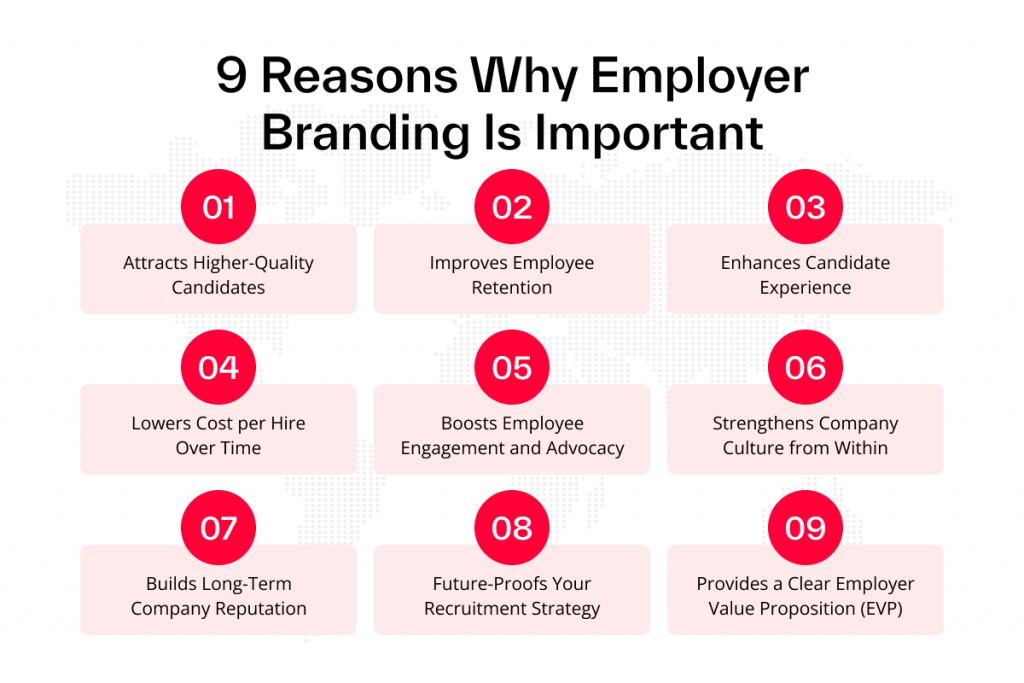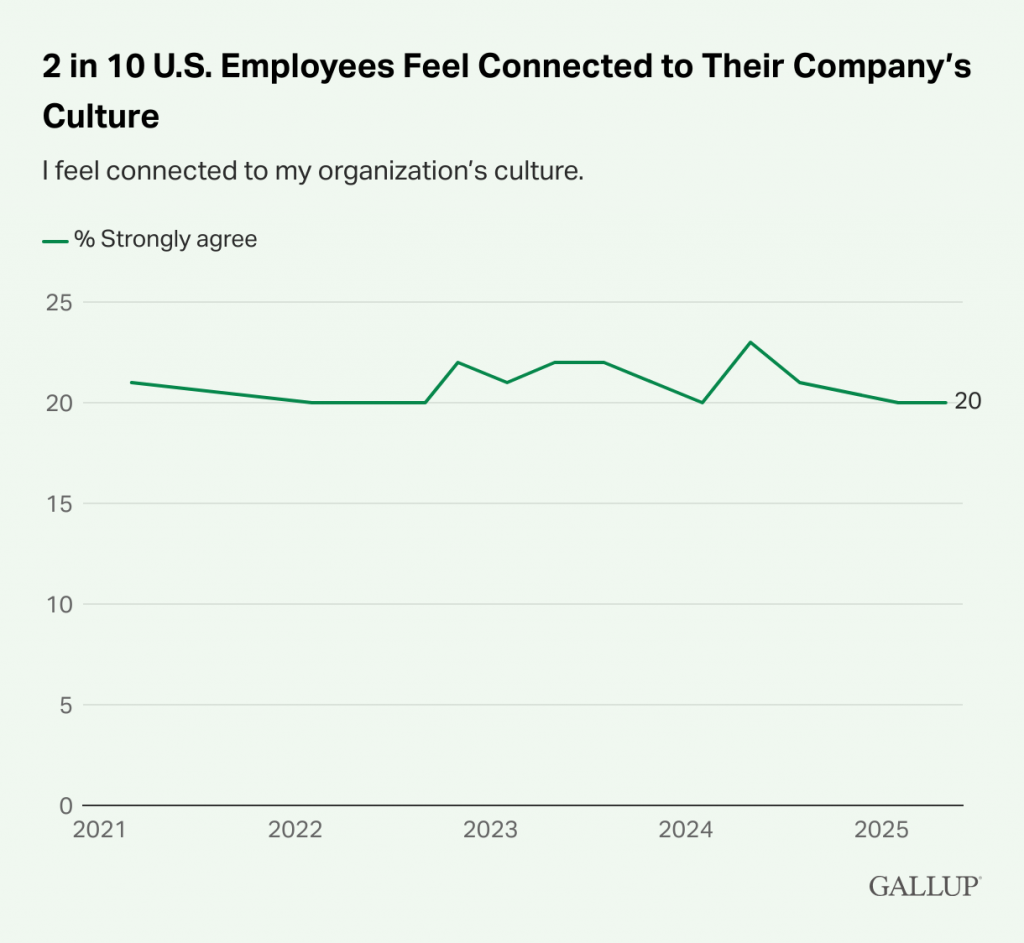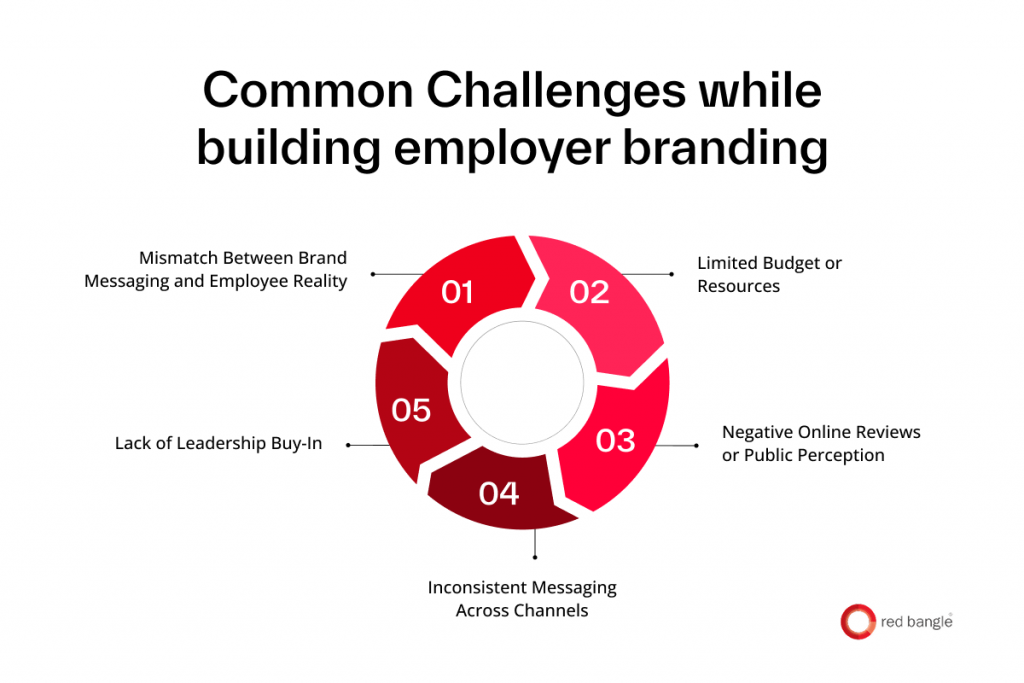Why Is Employer Branding Important in 2025?
Wondering why employer branding matters in 2025? This guide shows how a clear EVP, authentic employee stories, and consistent candidate experiences boost quality hires, retention, and reputation, while lowering cost-per-hire. Get practical steps, metrics, and fixes for common pitfalls.

Introduction
If you’ve ever struggled to hire the right talent or noticed employees leaving sooner than expected, you’ve already felt the impact of employer branding. In today’s competitive market, people aren’t just looking for a job; they’re looking for a workplace that aligns with their values, supports their growth, and makes them proud to be part of the team. That’s why your employer brand matters more than ever.
Think of it this way: your employer brand is the reputation you build as a workplace. It shapes how candidates view your company, how engaged your employees feel, and even how customers perceive you. A strong employer brand gives you an edge in attracting top talent, retaining the people you already have, and creating a culture that drives long-term success.
This guide will walk you through why employer branding is important, the challenges you may face while building it, and the practical steps you can take to strengthen your reputation as an employer.
What Is Employer Branding?
Before you can improve your employer brand, you need to understand what it actually means. Employer branding is the way your company is perceived as a workplace, not just by potential candidates, but also by your current employees and even former team members.
It’s the story people tell about working with you, and that’s exactly why employer branding is important in HRM. It influences how HR teams attract, retain, and engage employees while shaping the overall perception of your workplace.
At its core, employer branding combines:
- Employer Value Proposition (EVP): What you offer employees in return for their skills, such as pay, benefits, career growth, and culture.
- Reputation: How your company is talked about on platforms like Glassdoor, LinkedIn, or even word of mouth.
- Culture & Workplace Experience: The day-to-day reality for your team, from collaboration to recognition to leadership style.
It’s important to note that employer branding is different from corporate branding or marketing branding. While corporate branding focuses on how customers view your business, employer branding is all about how people view you as a place to work.
Why It Matters Now – Trends & Market Forces
The need for a strong employer brand has grown significantly because of three major shifts:
- Talent Market Competitiveness: With remote work and global hiring, you’re no longer just competing locally; you’re up against employers worldwide.
- Generational Shifts: Gen Z and Millennials expect more than just a paycheck. They want purpose, flexibility, and transparency.
- Technology & Social Proof: Your reputation starts before the interview. Glassdoor reviews, LinkedIn posts, and employee stories all shape perceptions. Even a 0.5-point boost in Glassdoor ratings can drive 20% more job clicks and 16% more applications.
9 Reasons Why Employer Branding Is Important

Now that you know what employer branding is, let’s look at why it truly matters. Here are nine powerful reasons that show how a strong employer brand impacts hiring, retention, and overall company growth.
1. Attracts Higher-Quality Candidates
A strong employer brand doesn’t just bring in more applicants; it brings in the right ones. That’s where the importance of employer branding in recruitment becomes clear. It helps attract candidates who align with your values, goals, and long-term vision. Candidates who resonate with your values and culture are more motivated to apply and more likely to stay if hired.
LinkedIn research shows that companies investing in employer branding are three times more likely to make quality hires. By positioning your workplace as attractive, you naturally filter out mismatches and draw in top talent who already believe in what you stand for.
2. Builds Long-Term Company Reputation
Your employer brand is more than a hiring tool; it’s your reputation in the market. Reviews on sites like Glassdoor, employee posts on LinkedIn, and even casual conversations outside of work all contribute to how people perceive your company. That perception sticks, whether positive or negative.
A strong brand ensures you’re seen as a trustworthy and desirable place to work, even during challenging times. Over the long term, this reputation not only attracts talent but also strengthens customer trust, investor confidence, and overall business credibility.
3. Enhances Candidate Experience
Your employer brand starts from the very first interaction. Every detail, from the clarity of your job descriptions to how quickly you follow up after interviews, shapes how candidates feel about your company. A positive experience signals that you value people, not just positions.
In fact, candidates often mention on platforms like Reddit that the small things make a huge difference, such as timely communication, avoiding robotic questions, and providing genuine feedback, even in rejection. When you deliver on those basics, you leave candidates with a sense of respect and trust, which can turn them into future applicants.
4. Lowers Cost per Hire Over Time
Replacing an employee can cost up to 2x their annual salary, making hiring one of the most expensive parts of running a business. A strong employer brand helps reduce this burden by attracting candidates who already want to work with you. Instead of relying heavily on costly job boards or third-party recruiters, your reputation does the heavy lifting.
Over time, this leads to shorter hiring cycles and fewer resources spent on sourcing. The compounding effect is significant, such as lower cost per hire, reduced turnover, and an HR team free to focus on creating a better employee experience once talent is onboard.
5. Boosts Employee Engagement and Advocacy
When employees are genuinely proud of where they work, they naturally turn into ambassadors for your company by sharing job postings, talking positively about the culture, and amplifying your brand on platforms like LinkedIn.

And the connection is clear: according to DSMN8’s 2025 Employee Advocacy Benchmark Report, 34% of organizations say the biggest impact of their advocacy programs is higher employee engagement. One way to fuel this advocacy is by creating engaging content in formats employees love to share, such as culture films, testimonials, or other effective B2B video types that highlight your workplace story in authentic ways.
6. Future-Proofs Your Recruitment Strategy
Hiring needs never stay the same. Sometimes you’re scaling fast, other times you’re navigating a slowdown. A strong employer brand gives you stability in both situations. When people already recognize and respect your company, you have a ready-made pipeline of interested candidates to tap into, showing clearly how employer branding helps in recruitment by keeping your talent pool warm and engaged, even before roles open up..
This long-term advantage means you’re not starting from scratch every time a new role opens up. Instead, your brand keeps talent engaged with your company over months or even years, making it easier to adapt to market shifts and business growth without scrambling for hires.
7. Improves Employee Retention
Attracting great talent is only half the battle. Retaining them is where employer branding truly proves its value. When the external promise of your brand matches the day-to-day reality employees experience, it builds loyalty and a sense of belonging. That alignment reduces the urge to look elsewhere.
In fact, Gartner found that companies with a strong Employee Value Proposition (EVP) experience 69% lower turnover and are 50% more likely to engage passive candidates in competitive markets. A workplace people are proud of doesn’t just lower attrition—it creates stability and protects your bottom line.
8. Strengthens Company Culture from Within
A Gallup report shows that only 20% of U.S. employees strongly agree that they feel connected to their organization’s culture. It shows how often companies fall short in building real alignment. A strong employer brand helps bridge that gap. When your values and mission are clearly communicated, employees understand what the company stands for and how their work contributes to the company’s overall vision.

Over time, employer branding becomes cultural glue; it shapes behaviors, reinforces shared values, and ensures everyone, from leadership to new hires, pulls in the same direction. The result is an authentic, resilient culture that people genuinely want to be part of.
9. Provides a Clear Employer Value Proposition (EVP)
At the heart of employer branding is your Employer Value Proposition i.e., the promise you make to your employees about what they’ll gain by working with you. Defining your EVP forces clarity: what do you stand for, what makes you different, and why should someone choose you over another employer?
When your EVP is strong and consistent, it guides everything from recruitment messaging to internal culture. Candidates know what to expect, employees feel connected to the bigger picture, and your company builds a reputation for authenticity. It’s the anchor that keeps your employer brand credible and trustworthy.
A great example comes from Red Bangle’s work with Wipro at the HIMSS healthcare conference. In an environment crowded with competing tech providers, Wipro needed to communicate complex healthcare solutions in a way that stood out.
Red Bangle created nine animated business impact stories in just 45 days, using sharp scripts, kinetic typography, and engaging visuals to make Wipro’s message resonate. The result was not just visibility at a busy event, but a stronger perception of Wipro as an innovative and credible brand. Similarly, investing in creative storytelling for your employer brand through culture films, employee stories, or corporate explainer videos helps ensure your company remains visible, differentiated, and attractive to talent even in highly competitive markets.
Common Challenges While Building Employer Branding & How to Overcome Them

Even if you understand why employer branding is important, putting it into practice isn’t always easy. Many companies face hurdles that can weaken their brand or slow down progress. Here are some of the most common challenges and how you can tackle them.
1. Mismatch Between Brand Messaging and Employee Reality
One of the quickest ways to damage your employer brand is to promise one thing externally but deliver something different internally. If your careers page highlights flexibility and growth, but employees experience micromanagement and limited opportunities, the disconnect shows up fast in reviews and turnover.
How to fix it: The best way is by spotlighting real employees instead of polished brand ambassadors. For example, Red Bangle’s Know Your Recruiter series with Infosys put recruiters front and center; not to sell the brand, but to share who they are as people. This kind of authenticity bridges the gap between messaging and reality, ensuring what you showcase externally matches what employees truly experience.
2. Limited Budget or Resources
Not every company has the budget of a Fortune 500 to run flashy campaigns. But in reality, authentic storytelling doesn’t always mean huge spends; it’s about smart choices. For example, knowing why to hire a video production agency can make a difference: agencies bring creative expertise, scalable production quality, and speed that in-house teams often lack, all while keeping costs predictable.
How to fix it: Start small and focus on storytelling. Encourage employees to share authentic experiences on LinkedIn, update your careers page, or highlight workplace wins on social media. Authentic content costs little but makes a big impact.
3. Negative Online Reviews or Public Perception
A single bad Glassdoor review can feel like a dent in your reputation. Left unaddressed, it may even overshadow the positives.
How to fix it: Don’t ignore negative reviews. Respond thoughtfully and show candidates you take feedback seriously. Internally, act on patterns in complaints to fix root issues. Over time, authentic positive reviews will outweigh the negatives.
4. Inconsistent Messaging Across Channels
If your LinkedIn, careers page, and interview process tell different stories, candidates get confused, and that hurts trust.
How to fix it: Create a unified messaging guide for your employer brand. Align recruiters, hiring managers, and marketing teams so the story is consistent everywhere candidates interact with you.
5. Lack of Leadership Buy-In
Employer branding isn’t just an HR or marketing project—it needs support from the top. Without leadership buy-in, initiatives lose momentum quickly.
How to fix it: Present employer branding as a business strategy, not just a hiring tool. Use data to show its impact on retention, cost per hire, and overall business growth. When leaders see the ROI, they’re more likely to champion it.
Actionable Checklist for Auditing Your Employer Brand
Use this quick checklist to evaluate where your employer brand stands today and what needs attention:
- Is your careers page clear, up to date, and reflective of your culture?
- Do your job descriptions highlight your EVP and avoid jargon?
- Are your Glassdoor/Indeed reviews monitored and responded to thoughtfully?
- Have you gathered employee feedback through surveys or interviews in the past 6 months?
- Is there consistency between what you say externally and what employees experience internally?
- Do employees feel proud enough to share their experiences on LinkedIn or refer others?
- Is your social media presence showcasing authentic workplace stories?
- Are leaders and managers aligned with your employer brand message?
- Do you track key metrics like time-to-hire, retention rate, and referral rate?
A simple audit using this list can reveal gaps quickly and help you prioritize where to act first.
Employer branding isn’t just about how your company looks from the outside; it’s about creating a consistent, authentic experience that employees and candidates can trust. When your promises align with reality, you attract the right talent, build loyalty, and strengthen your workplace culture.
Over time, this reputation becomes one of your biggest business assets, lowering hiring costs, improving retention, and setting you apart in a competitive market. This is also why branding is important for business, because it influences not just hiring, but customer perception, loyalty, and long-term success.
Your culture is your strongest asset, and we help you showcase it. Through powerful visuals and storytelling, Red Bangle transforms everyday workplace moments into narratives that engage, attract, and retain talent.
If you’re ready to build an employer brand people feel connected to, reach out to us today.



